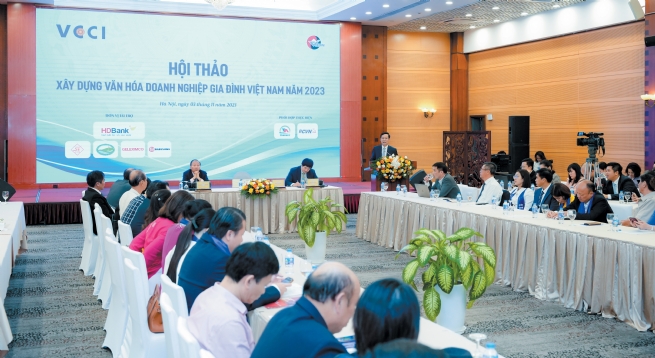Building Family Business Culture for Sustainable Business Development
Developing family businesses is very important because this is one of the sources for forming a powerful nationalist business force. In other words, family businesses are an important part of the “nationalist business” force.

Workshop on “Building a family business culture” hosted by the Entrepreneurial Culture Center under the Vietnam Chamber of Commerce and Industry (VCCI).
This is the statement made by VCCI President Pham Tan Cong at the Workshop on “Building a family business culture” hosted by the Entrepreneurial Culture Center under the Vietnam Chamber of Commerce and Industry (VCCI). The event in Hanoi attracted nearly 200 attendants.
VCCI established the Vietnam Family Business Council in 2014, Mr. Cong said, adding that the country has carried out many practical family business development activities over the past 10 years. Last October, on the occasion of celebrating the Vietnam Entrepreneurs' Day, the Vietnamese business community happily received a special gift from the General Secretary and the Politburo - Resolution No. 41 on building and promoting the Vietnamese entrepreneur force in the new era. Resolution 41 crucially defines the important role of entrepreneurs as a core force in carrying out industrialization and modernization and building an independent and self-reliant economy. In addition, the Resolution provides orientations and solutions to develop and promote Vietnamese entrepreneurs, with a strong requirement for developing a nationalist entrepreneur force, which is a very important content to build an independent and self-reliant economy of Vietnam.
Resolution 41 also aims to develop Vietnamese entrepreneurs with business ethics, business culture with national identity and social responsibility. Taking business ethics and business culture as the core to build a Vietnamese entrepreneur force and shape business ethics and business culture is also an indispensable requirement for sustainable business development.
Mr. Pham Dinh Doan, Member of the VCCI Executive Committee, Chairman of the Vietnam Family Business Council, President of Phu Thai Group, said that Vietnamese businesspeople and their families have enough courage, vision, talent and wisdom for development, and readily shoulder the pioneering mission of economic development with the spirit of self-reliance, national self-respect and the desire to elevate the country to become a powerful and prosperous independent nation.
After 37 years of Doi Moi (renovation), Vietnam has formed a strong business community, with over 900,000 companies, over 20,000 cooperatives and over 5 million individual business households. This important force has helped execute Party and State guidelines and policies on economic development, transform Vietnam from an underdeveloped and backward country into the 37th largest economy of the world and stand in Top 20 international trade on the globe.
Family businesses are an important element. Over 5 million individual business households can be considered micro family businesses. Building the family business culture will help foster business culture and create a solid foundation for developing strong entrepreneurs and enterprises, building a prosperous and happy Vietnam which will become a developed economy by 2045 as stated in the Resolution of the 13th National Party Congress.
Family businesses are also the main form of business in the world. They always excel in prestige and always grow strongly over many generations. Therefore, Vietnam needs to build and practice business ethics, helping form the unique cultural identity of Vietnamese businesspeople, he said. In the future, family businesses will certainly grow strongly because their potential is still huge.
Family culture and business culture are not only spiritual wellbeing, organically related to production, business and service activities, but behind the success of an entrepreneur is a cultured family. Then, family culture becomes a characteristic asset of family business. Building a family business culture is a strategic goal that fits current contextual requirements.
However, beside their advantages, Vietnamese traditional family businesses also face barriers that impede their development. According to Ms. Ha Thi Thu Thanh, Chairwoman of Deloitte Vietnam Co., Ltd, in the current context, if a family business is transferred, inherited and administered a hierarchical style (older children over young children, sons over daughters rather than capabilities), it will be very difficult to keep its organizational values and develop. She said, the unsuccessful transfer of family business from the current generation to the next outnumbers successes.
According to Ms. Thanh, as a consultant to support transparency for corporate governance, based on successful lessons on business transfer, inheritance and administration from Western countries, it is sometimes necessary to use bequest regulations to resolve many unnecessary family disputes even when the owner is still alive.
While family businesses follow the traditional Eastern style, leaders sometimes act emotionally, avoid disputes and place trust on relationships rather than work performance. Meanwhile, leaders of Western-style family businesses often base decisions on family culture-measurable factors such as communication, persuasion, leadership and decision-making. The Western approach has a more straightforward assessment in family businesses. A person who has a vision, performs his/her work well, respects the organization's values and achieves maximum efficiency for the organization will have a place in the family business.










